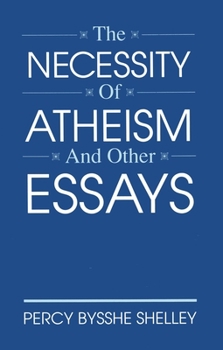The Necessity of Atheism and Other Essays (The Freethought Library)
The great Romantic poet Percy Bysshe Shelley (1792-1822), best known for such masterpieces as "Ode to the West Wind" and "Prometheus Unbound," also expressed his ideas on religious oppression in works of impassioned prose.The Necessity of Atheism and Other Essays features five anti-religious tracts by Shelley: "On Christianity," "The Necessity of Atheism" (which resulted in the youthful Shelley's expulsion from Oxford in 1811), "On Life," "On a Future State," and "A Refutation of Deism." Like his great poems, these works extol the spirit of mankind and argue that Christianity, with its repressive belief system, is wholly out of keeping with human ideals and aspirations.A philosopher as well as a poet, Shelley argues that the divine attributes of God are merely projections of human powers; life everlasting cannot be empirically demonstrated, for it runs counter to all the evidence for mortality given by the natural world, which is the only world we know.During his brief life, Shelley affronted the armies of Christendom with a single-minded purpose. As Shelley observes in his dialogue "A Refutation of Deism," there can be no middle ground between accepting revealed religion and disbelieving in the existence of a deity - another way of stating the necessity of atheism.In all, these essays provide an important statement of the poet and freethinker's enlightened views on skepticism, faith, and the corruption of organized Christianity
Format:Hardcover
Language:English
ISBN:0879757744
ISBN13:9780879757748
Release Date:June 1993
Publisher:Prometheus Books
Length:95 Pages
Weight:0.75 lbs.
Dimensions:0.6" x 6.3" x 9.3"
Customer Reviews
4 ratings
THE NECESSITY OF ATHEISM
Published by Thriftbooks.com User , 16 years ago
What Shelley tried to establish in the essays of this volume was the logical necessity of atheism, that is, from commonly accepted premises, atheism necessarily follows. Though I found in Shelley an unexpected kindred spirit, I must admit that he does not succeed. Shelley states that "the senses are the sources of all knowledge" (p. 32), and declares, "Locke has proved that ideas result from sensation" (p.86). However, Locke's tabula rasa is a model rather than a proof, and it is not indisputable. Since irrational numbers, for instance, cannot be sensed, how can this model account for the idea of them? (Yes, I know Hume's explanation; I just do not find it convincing). In another instance he writes, "In the language of reason, the words God and the Universe are synonymous" (p. 87). Though I agree with this, Shelley's premise for this conclusion was "that which is infinite necessarily includes that which is finite." This is not true; for example, the infinite set of odd integers does not include the even integers between 2 and 20.* Though many of Shelley's arguments are based on the premise of materialism, he emphasizes that his atheism only negates a creative Deity; "The hypothesis of a pervading Spirit coeternal with the universe remains unshaken" (p. 31), which certainly contradicts the doctrine of strict materialism. Shelley does not expound upon this Spirit, though he implies that Christ spoke for this Spirit, and that Christ's authentic wisdom was distorted by hypocritical dogma. "Blessed are the pure in heart, for they shall see God," does not mean that after death those who have faith that Christ died for their sins will stand before the Creator, but that whosoever "aspires to that which the divinity of his own nature shall consider and approve - he has already seen God" (p. 5). He declares that the doctrine of the pointlessly cruel eternal torture of Hell is necessarily at odds with Christ's exhortation to "Love your enemies, bless those that curse you." For Shelley, "God is a model through which the excellence of man is to be estimated, whilst the abstract perfection of the human character is the type of the actual perfection of the divine" (p. 14). Shelley was more like a Buddhist than an atheist. A main point of Shelley's argument is that "Belief is not an act of volition, nor can it be regulated by the mind: it is manifestly incapable therefore of either merit or criminality" (p. 68). I became an atheist at the age of eleven, and I recall being especially impressed with the truth of the assertion that belief is not an act of free will. I had been indoctrinated into Christian mythology in conventional Sunday school classes, which means that the idea of questioning what I was taught never occurred to me, and certainly it was never suggested that I should. Yet when I first heard the arguments of an atheist, after no more than minute or so of defending my belief in God, I was shocked to realize that I no longer believ
Shelly prose
Published by Thriftbooks.com User , 19 years ago
I didn't realize such modern ideas existed in the days of the great ones.
bertrand russell is more accessable...
Published by Thriftbooks.com User , 23 years ago
Frankly, I'm more impressed with Bertrand Russell's _Why I am not a Christian_ than with this book...Shelley's writing is couched in such period rhetoric (early 19th century / late 18th century style) as to be rather clumsy and turgid for the modern reader, and the assumtions and argumentation rely on premises that are often faulty or no longer seem valid in the contemporary world.All that having been said, the short essay "On Life" was most impressive indeed and in many ways seems a foreshadowing of Postmodernism. Very startling to see that Urquelle in a text like this.This book looks great on a bookshelf, but is a little dissapointing in the actual reading of it, save for "On Life". The title essay is especially disappointing. Oh well...
Shelley's thoughts on Life and God
Published by Thriftbooks.com User , 24 years ago
This book is an excellent introduction to Shelley's existencial thought, containing some impressing essays such as "The necessity of atheism" and "On Life". It also helps the reader to understand the marvellous personal "animus" that hiddened beneath Shelley's great poems.






